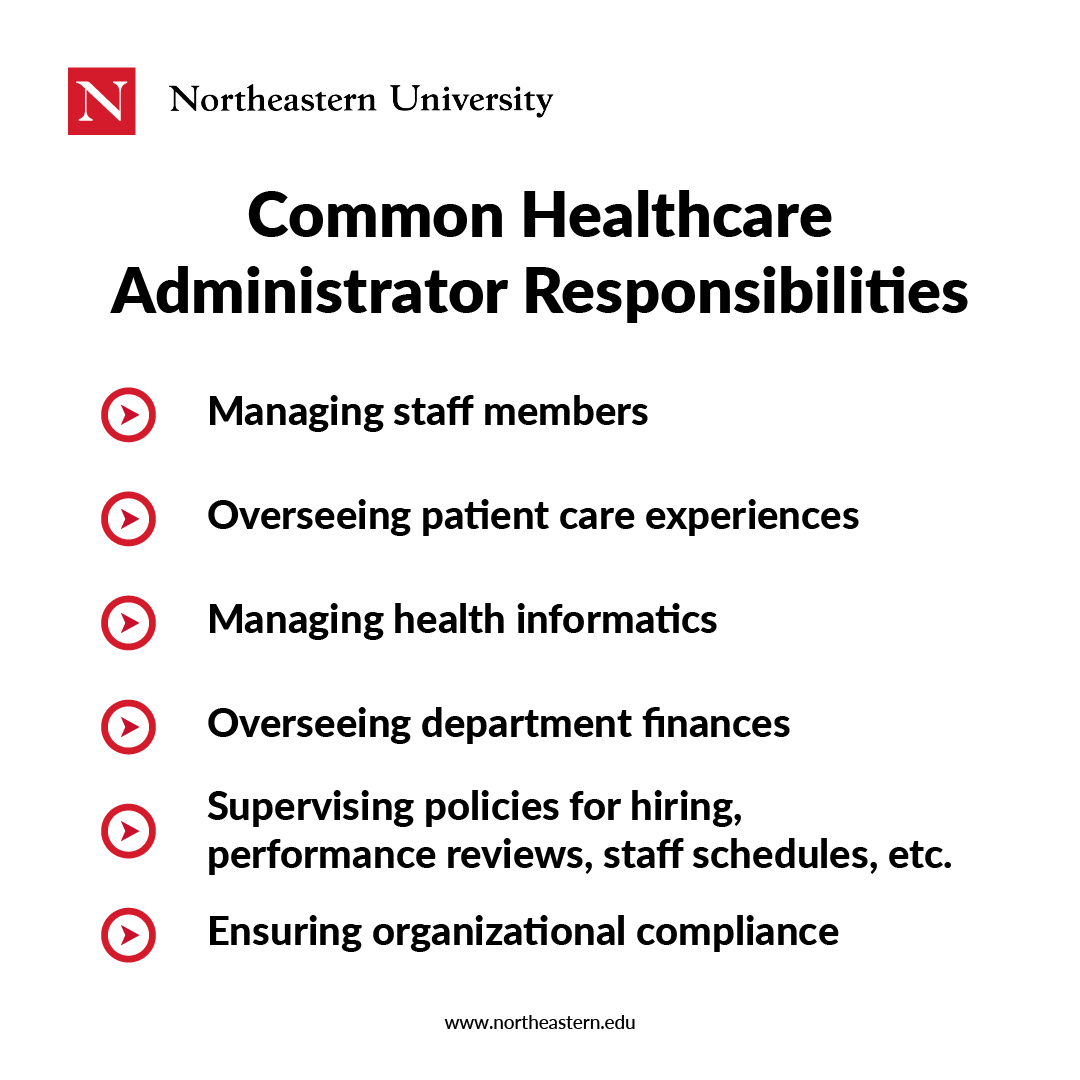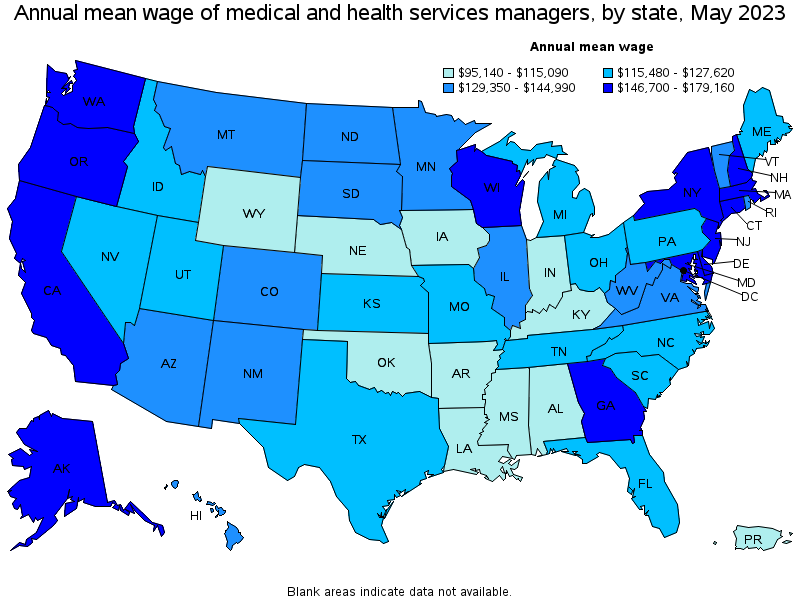At one point or another, most people have experienced the pain of a health care system that is exceedingly complex and cumbersome. As a healthcare administrator, you can have a lasting impact on improving the system in many ways. Professionals in this field have tremendous opportunities to effect change, from drafting public health policies to developing more effective health programs.
Becoming a healthcare administrator can be a rewarding career for people with a strong business sense and an interest in delving into how healthcare works. Read on to learn more about the role of a healthcare administrator and how you can advance your career in this exciting field.
Healthcare Administrator Responsibilities
Healthcare administrator responsibilities may vary depending on the type of organization where they’re employed; however, they are typically responsible for:
- Managing staff within a facility or department
- Managing the client care/patient care experience
- Managing health informatics, including recordkeeping
- Overseeing the financial health of the department or organization
- Managing human capital, including policies for hiring, performance reviews, staff schedules, etc.
- Ensuring an organization’s compliance with medical and legal regulations and internal policies

Debunking Misconceptions about Healthcare Administration Roles
There are some common misconceptions about healthcare administration that may make some people overlook this rewarding career. As a professor in health management, Dr. Avalon shares a few facts about the profession that people often don’t know:
Myth #1—You won’t make much of a difference in people’s lives. “Healthcare administrators do play a role in transforming quality of care,” Dr. Avalon says. Professionals in the field are making advancements in exciting ways that are profoundly changing patients’ lives, such as using informatics to help improve clinicians’ ability to make diagnoses, implementing programs that support personalized medicine, and using technology to foster healthier living habits.
Myth #2—Healthcare administrators are responsible for patient care. Healthcare administrators typically do not get involved directly with patient care. They are focused on the administrative, financial, and managerial side of the organization. “Healthcare is changing so much, and employers recognize the need for someone who is tasked with looking at the sustainability of the organization,” Dr. Avalon says. “Oftentimes that is a completely different skill set from a clinician who’s responsible for providing direct care to patients.”
Myth #3—Healthcare administration is only for industry veterans. “You don’t have to have worked in healthcare for a long time to advance in the field,” says Dr. Avalon. “Many healthcare organizations have recognized that they need diverse perspectives at the table. One employee might have started out in marketing position in a Fortune 500 company and now they’re the head of the hospital’s marketing department. There’s always a place for someone with the right skills and drive to succeed.”
Myth #4—It’s difficult to strike a healthy work/life balance. “Many healthcare administrators have a great deal of flexibility in their schedules,” Dr. Avalon says. “There are whole departments that work remotely, which is an added perk of working on the administrative side of healthcare.”
Healthcare Administrator Career Outlook
There is a tremendous demand for healthcare administrators, with the Bureau of Labor Statistics predicting a 20 percent growth in employment of medical and health services managers through 2026. This is much faster than the average growth of other occupations, due in part to the increased demand for healthcare services as baby boomers age and remain active later in life.
“Healthcare administrators are more important now than ever,” says Dr. Earlene Avalon, assistant professor and lead faculty member for the Health Management and Health Sciences Programs at Northeastern’s College of Professional Studies. “The more complex our healthcare system gets, the more there is a need for greater accountability as well as a reining in of medical care costs. And as more hospitals are merging because of funding-related issues, there is a greater need for professionals who understand the impact this has on patient care, the community, and personnel.”
In addition, the emergence of healthcare applications has brought new opportunities for healthcare administrators. “The confluence of healthcare and IT is driving a demand for people who understand the implications this has on everything from legal issues to operational issues,” Dr. Avalon says. “These companies need someone at the table who understands the healthcare sector and how technology can improve health outcomes.”
Healthcare Administrator Career Opportunities
There are a wide variety of organizations seeking professionals who can plan, direct, and coordinate various aspects of healthcare services. Healthcare administrators are needed in:
- Hospitals and health centers
- Eldercare facilities
- Insurance companies
- Health IT startups
- Dental offices
- Consulting firms
- Community-based organizations
- Pharmaceutical and medical device companies
- Public health organizations
- Research institutes
- Healthcare consulting firms
- Medical and diagnostic laboratories
- Nursing or residential care facilities
Though the job titles vary depending on the discipline or organization, common titles for these professionals include healthcare administrator, medical administrator, practice manager, and program administrator.
Healthcare Administrator Salaries
The median annual salary for a medical or health services manager is $99,730. According to the Bureau of Labor Statistics, the top paying regions for this occupation are:
- Washington D.C.: $145,760
- New York: $143,030
- Massachusetts,: $133,900
- Delaware: $131,260
- Connecticut: $129,480

Essential Healthcare Administrator Skills
Professionals who succeed in the field tend to be those who have both strong business acumen and a dedication to quality of care. In addition, they share the following essential skills:
- Empathy
- Active listening
- Critical thinking
- Sound decision making
- Ability to work independently and on a team
- Written and oral communication
- Conflict resolution
- Project management
Starting a Career in Healthcare Administration
There are several steps that are recommended for those looking to break into the health administration field.
1. Invest in your education. An individual’s educational background impacts the types of jobs available to them in the healthcare field.
Potential Job Titles by Education Level
Associate Degree: Healthcare Coordinator, Execuitive Assistant, Administrative Assistant/Associate
Bachelor’s Degree in Health Management: Assistant Director, Senior Manager, Manager, Assistant Manager, Supervisor, Program/Project Manager, Healthcare Consultant
Master’s Degree in Public Health, Business Administration, or Hospital Administration: Director, Deputy Director, Vice President, President, CEO, Cheif Operations Officer, Healthcare Consultant
2. Learn from fellow students. “In a classroom setting—particularly an online one—students with distinct perspectives share amazing life experiences, and that adds to the richness of discussions and learning opportunities,” Dr. Avalon notes. “Students walk away from those conversations more enlightened about where we can take healthcare in the future.”
3. Join professional organizations. “Networking is extremely beneficial for those looking to get started in healthcare administration,” Dr. Avalon says. “For example, the American Public Health Association and the American College of Healthcare Executives have local chapters and events that offer discounted rates for students.”
4. Meet industry professionals. Dr. Avalon suggests attending conferences to learn the “language” of the industry and interact with key players in the field.
5. Immerse your interests in the field. “Learn about emerging trends in healthcare, as this can help you uncover a specific area of interest to focus on in your career,” she adds.
Earning a Degree in Healthcare Administration
A degree in health management is ideal for professionals looking to advance their careers in a non-clinical setting. These degree programs provide students with foundational knowledge in healthcare management and related ethical issues, human resources, healthcare law and regulations, health informatics, health operations, risk management, and quality assurance. “A health management degree allows you a lot of flexibility in shaping your career path,” Dr. Avalon explains.
Experiential learning is an exciting aspect of degree programs at Northeastern, where students can gain real-world experience and learn about best practices in the field. Students enrolled in Northeastern University’s Bachelor of Science in Health Management program have the opportunity to complete internships both virtually and online. For example, one recent virtual project involved helping a non-profit organization in West Africa that focuses on women’s health identify potential funders.
“The project enabled my students to gain an understanding of healthcare on a global level and the importance of donor relations and funding in order to provide vital medical services,” says Dr. Avalon.
Students who work in the healthcare discipline might also consider completing their internship at their place of employment, which can ultimately help their overall professional development.
If you’re interested in becoming a healthcare administrator, Northeastern’s Bachelor of Science in Healthcare Management program might be your next step. Explore the program page or connect with an advisor to receive personalized advice.
